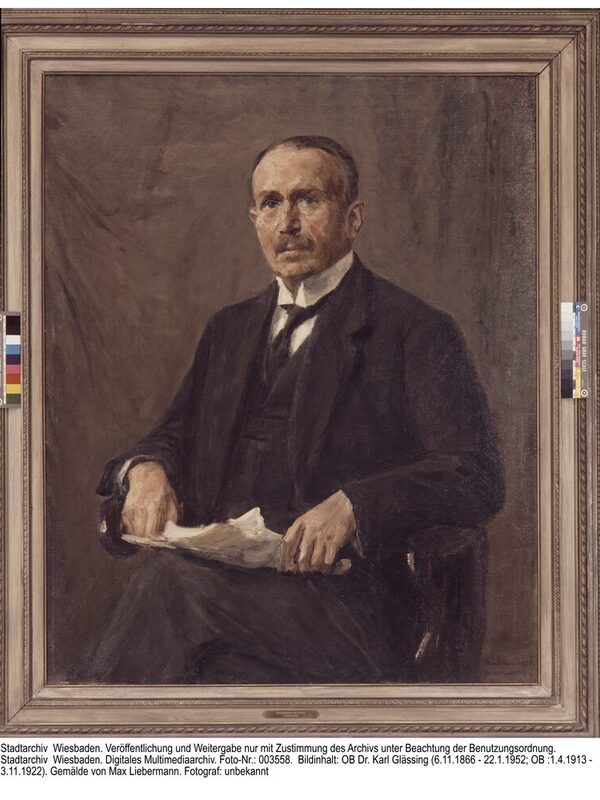Glässing, Karl
Glässing, Karl
Lawyer
Born: 06.11.1866 in Darmstadt
died: 22.01.1952 in Darmstadt
After graduating from high school in 1887, Glässing studied law and political science in Munich and Giessen until 1894. He then worked in the Hessian civil service, including as Privy Senior Finance Councillor in the Grand Ducal Hessian Ministry of Finance in Darmstadt.
In 1909, he became mayor of Wiesbaden. From 1913-19, Glässing, a lawyer with no party affiliation, was Lord Mayor of Wiesbaden, succeeding Karl Bernhard von Ibell. Soon after he took office, the First World War began, at the start of which all foreign spa guests were expelled from Wiesbaden. Glässing had to organize both this dramatic economic setback and the transformation of Wiesbaden into a hospital town. On December 4, 1918, he received the returning front-line soldiers, and on December 13, two days after the armistice of Compiègne, the French occupying troops entering the city.
In this difficult situation for Wiesbaden, Glässing kept an overview and found the right words for both the returning German soldiers and the French. Soon, however, he himself came into confrontation with the occupying forces. In 1919, he refused to take part in a parade with the French military on the Schlossplatz. The magistrate also stayed away from a later "peace treaty celebration" and a parade for the French national holiday on July 14, which the French resented. In June 1919, he also had to deal with the separatists, who proclaimed a "Rhenish Republic" and wanted to separate it from the German Reich. Marshal Ferdinand Foch, head of the Inter-Allied Rhineland Army, had Glässing expelled on November 5, 1919 on the flimsy grounds that he had mismanaged the administration and informed the French too late about coal shortages. The unanimous protest of the town council against this was in vain. In 1922, Glässing was made an honorary citizen.
He returned to Darmstadt, where his brother Wilhelm was Lord Mayor, and became Finance President. After his retirement in 1933, he moved back to Wiesbaden.
Glässing is buried in Darmstadt. The connecting street between Wilhelmstraße and the Dern site is named after him.
Literature
Müller-Werth, Herbert: Geschichte und Kommunalpolitik der Stadt Wiesbaden unter besonderer Berücksichtigung der letzten 150 Jahre, Wiesbaden 1963.
Munz, Marius: "Wiesbaden est boche, et le restera." The Allied occupation after the First World War 1918-1930, Wiesbaden 2012 [90 ff.]
Renkhoff, Otto: Nassau Biography. Kurzbiographien aus 13 Jahrhunderten, 2nd ed., Wiesbaden 1992 (Veröffentlichungen der Historischen Kommission für Nassau 39) [p. 232].
